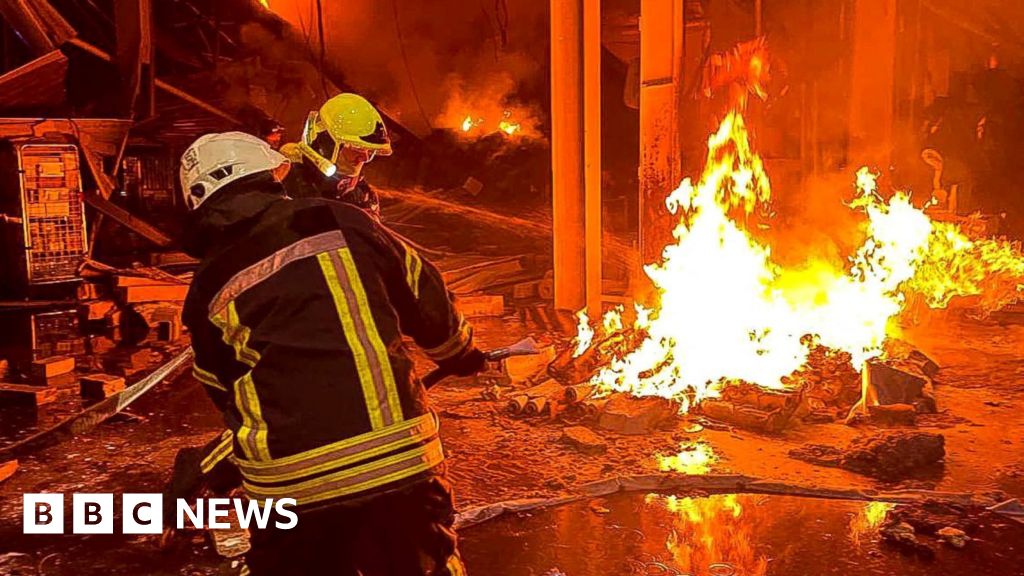- Matt Murphy & James Lonsdale, Diplomatic Correspondent
- BBC News
Ukrainian troops have recaptured several settlements in the east of the country
“Very heavy fighting” is raging in parts of Ukraine as Kiev forces continue their counteroffensive, according to the country’s deputy defense minister.
Hanna Maliar wrote in a telegram that Ukrainian forces were able to advance near Pakmut in the east and Zaporizhia in the south.
But she acknowledged that Russian forces are mounting tight security in some areas.
His comments came after another night of Russian missile and drone attacks on cities across Ukraine.
Russia has stepped up its bombing campaign in recent weeks, despite President Vladimir Putin admitting his forces are suffering from a shortage of missiles and drones.
Early Thursday morning, Ukraine’s military reported overnight attacks on industrial complexes in the Dnipropetrovsk region. Regional military spokesman Serhiy Bratchuk said drone strikes in the Black Sea region of Odessa were repelled by air defense systems.
Earlier in the day, three people were killed in a strike on a warehouse and a shopping center in the city of Odessa.
Kyiv’s much-anticipated breakthrough has been a long time in the making, and Ukrainian officials have accused Russia of stepping up strikes in recent weeks to divert attention from the offensive.
The Ukrainians say their troops have recaptured seven settlements and at least 90 square kilometers (35 square miles) since launching their counteroffensive.
Ms Maliar wrote in a telegram that Ukrainian troops had advanced around the city of Baghmut, long the center of a bloody and bloody battle with Russian forces.
He said the soldiers had advanced 200m to 500m towards the city and 300m to 500m in southern Zaporizhia province. The BBC cannot independently verify these claims.
But he acknowledged that the counter-offensive has already led to some “very heavy fighting” as Ukrainian forces try to break through well-established Russian defensive lines.
Senior Western officials have warned against the idea that Russian forces will simply “melt down” in the face of Ukrainian attacks, adding that Kevin’s gains have already been “costly”.
“Russian forces generally maintained a good defense from their well-prepared, protected positions and were retreating between tactical lines,” the sources said.
“This ‘maneuver defense approach’ is challenging for the Ukrainians and costly for the offensive forces. Therefore, progress is slow at the moment,” they observed, adding that it is too early to tell how effective Ukraine’s offensive has been.
But as Russia had months to prepare defensive lines, they insisted that heavy losses should be expected.
“It’s never going to be without risk,” they said. “What we’re seeing is not unexpected. It’s tough, and it’s going to be a challenge for the Ukrainians. What we’ve seen is that they continue to push where they’ve lost and then continue to improve. So overall it’s going in the right direction.”
Both sides have reported mounting casualties among their opponents, which have not been independently verified.
Attacks on the Black Sea port city of Odesa on Wednesday night killed three people in the east, Ukrainian officials said.
Another 13 people were injured in early morning attacks that targeted a warehouse and damaged shops.
The southwestern city is vital for Ukraine’s grain exports across the Black Sea and has come under frequent missile attacks during the war.
Russia launched 10 missiles and 10 drones overnight, most of which were shot down by air defenses, military commanders said.
They added that three of the four KH-22 missiles launched from a Russian warship in the Black Sea were shot down and the last managed to hit Odesa.
image source, Ukrainian Armed Forces
Several civilian buildings were destroyed by the Russian attack in Odessa, including a shopping mall
The three dead were workers in a warehouse used as a food storage center, said Oleg Kiber, head of the region’s military administration.
“There may be people under the rubble,” he added. More civilians were injured after the bombing and “air warfare” damaged shops, restaurants – including McDonald’s – and residential areas, Mr Kipper wrote in the Telegram.
Elsewhere, strikes in the eastern cities of Kramatorsk and Kostiantynivka killed three more people and destroyed dozens of residential homes, Ukrainian officials said.
Six people, including four forestry workers, were killed in a Russian shelling attack in northeastern Ukraine on Tuesday. Ukrainian prosecutors said the attack took place near the village of Serydina-Buda near the Russian border.
The director of the UN’s nuclear watchdog has postponed a planned visit to the Zaporizhia nuclear power plant.
Senior Ukrainian officials say Rafael Grosi has agreed to delay his trip until it is safe to travel. The head of the International Atomic Energy Agency (IAEA) said on Tuesday that he was “deeply concerned” that the plant could be caught in the crosshairs of a counter-attack by Ukraine.
His officials have also stressed the need to access the site near the plant as the nearby reservoir, the Gakovka Dam, which supplies cooling ponds to the plant, has been destroyed.
Meanwhile, the State Duma in Moscow [parliament] Ukraine has approved a new bill that would allow the Defense Ministry to sign contracts with criminals convicted of fighting in Ukraine.
The new law would allow anyone who has been tried or convicted of a crime to sign up for the military, but before the verdict becomes final.
Those accused of crimes such as sex crimes, treason, terrorism or extremism are excluded from the law.
The move – widely seen as the latest attempt by the Russians to avoid moving to full military service – seeks to fill gaps left by mounting casualties.

